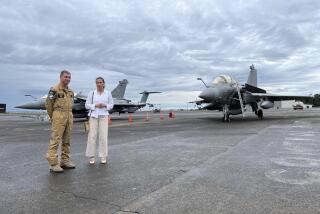Wide Differences Remain on Philippine Bases : Diplomacy: U.S. negotiator says he has a new package, but the other side begs to differ.
- Share via
MANILA — Nearly a year after they first met, U.S. and Philippine officials still must resolve broad differences when they resume sensitive negotiations today in what both sides hope will be a final week of talks to extend leases for strategic U.S. military bases here.
Special White House negotiator Richard L. Armitage, who arrived Monday afternoon for his sixth round of talks since last May, hopes to initial an accord by the weekend. A spokesman said he carries a new compensation proposal to help break an impasse over how long U.S. forces can stay and how much Washington must pay.
Armitage’s counterpart, Philippine Foreign Secretary Raul Manglapus, told reporters that the package contains nothing new, however. He warned that unless an accord is reached before the current pact expires in September, “then we will have to prepare for the withdrawal of the United States.”
Manila has demanded $825 million a year, including $400 million in cash or grants and the rest in debt relief and other assistance, for a seven-year extension of leases at Clark Air Base and the Subic Bay naval facility.
Washington has offered $360 million, plus varying proposals of “soft” compensation, including trade concessions and excess military equipment, for a 10- to 12-year period. In previous sessions, the United States agreed to turn over four smaller facilities and remove all combat aircraft.
A U.S. official said Armitage will not offer more money, adding, “We’re not going to pay more for less.” He said Armitage instead will seek “creative ways to pad the tab,” including housing loans, food aid and development assistance. Substantive relief of Manila’s $29-billion external debt is unlikely, he said.
Also still unresolved is whether an agreement will be cast as a formal treaty, as required in the 1987 Philippine constitution. U.S. officials hope to avoid a treaty, which would require ratification by the U.S. Senate. The Philippine Senate remains sharply divided, in public at least, on a new bases agreement.
Vice President Dan Quayle is likely to add the Philippines to his Asian trip next month if an agreement is reached, according to a U.S. Embassy spokesman.
Both sides have cloaked the months of often-contentious talks in theatrics and heated rhetoric, a result of the uniquely emotional nature of relations between Washington and its former colony.
Many Manila politicians describe the talks in terms of national sovereignty and issue polemics blaming the Americans for most of the Philippines’ ills. Partly as a result, Manila’s negotiating panel has appeared in sharp disarray, with members repeatedly disagreeing in public.
Frustrated American negotiators, anxious to conclude an agreement with less melodrama, stress the bases’ economic importance to Manila and call the talks a historic restructuring of a one-sided relationship. Armitage went even further Monday, calling them a “bilateral version of the new world order.”
In a statement read by a spokesman, Armitage emphasized that the United States already has acceded to numerous Philippine demands, including termination of the 1947 Military Bases Agreement, joint use and a new name for Clark Air Base, an agreement that the Philippines can compel an unconditional pullout of U.S. forces and a new status-of-forces agreement affecting such mundane issues as who will run taxis and deliver mail on the bases.
“The U.S. acknowledges that its use of Philippine military bases provokes an emotionally negative reaction among a small but influential minority of Filipinos who otherwise maintain very close personal and professional ties to the U.S.,” Armitage added, in an apparent jab at prominent anti-base activists here who maintain families, homes and businesses in the States.
Armitage also described the Philippines as “on the verge of becoming Asia’s newest tiger,” a term usually reserved for Taiwan, South Korea and Singapore and their roaring economies. Given the Philippines’ persistent political instability and severe economic problems, his prediction clearly represents a minority view.
In his only reference to the shrinking U.S. military posture after the Persian Gulf War, Armitage noted that Washington is committed to remaining a strong Pacific power.
“Although a significant part of our past was drawn from Europe, our future lies in Asia,” Armitage said.
Japan, Singapore and Thailand have said they want the bases to remain to help provide regional security. In a visit here earlier this month, Singapore’s new prime minister, Goh Chok Tong, publicly urged President Corazon Aquino to retain the bases to “maintain regional peace and stability.”
More to Read
Sign up for Essential California
The most important California stories and recommendations in your inbox every morning.
You may occasionally receive promotional content from the Los Angeles Times.













